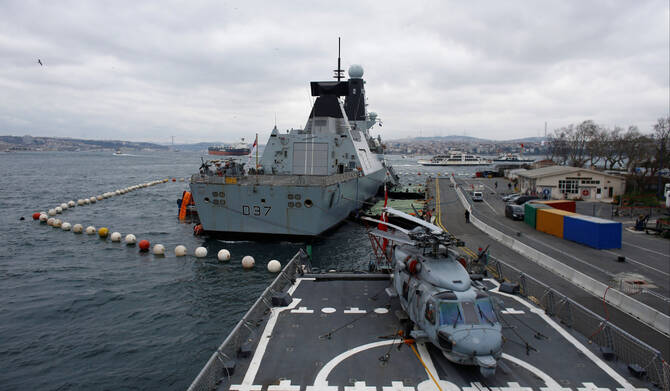UK naval presence in the Gulf 2025 is drawing scrutiny as the United Kingdom adjusts its maritime strategy in a region critical to global trade and security. The Royal Navy, which historically maintained a strong forward-deployed fleet in the Gulf, is now reducing permanent assets, raising concerns among Gulf allies and international observers about the UK’s long-term commitments.
Historical Role of UK Naval Presence in the Gulf 2025
UK naval presence in the Gulf 2025 builds on a long legacy of British maritime involvement in the region. Operation Kipion, the longstanding Royal Navy mission, stationed warships in Bahrain to protect shipping lanes, deter piracy, and support regional allies.
The Royal Navy’s presence has historically reassured Gulf nations and strengthened defense cooperation, including joint exercises and intelligence-sharing operations. For decades, the UK’s naval footprint symbolized a commitment to regional stability and the safety of critical maritime routes, including the Strait of Hormuz.
Changes in UK Naval Presence in the Gulf 2025
Recent developments show a strategic shift in the UK’s naval deployments. HMS Lancaster, a forward-deployed frigate in Bahrain, is scheduled to return to the UK for decommissioning. This reduction means the UK will temporarily lack a permanently based destroyer or frigate in the Gulf for the first time in decades.
The decision comes amid continued tension in the Gulf region, including Iranian threats to key shipping routes and ongoing geopolitical rivalries. Some analysts interpret this as a weakening of the UK’s visible commitment to Gulf security.
Strategic Implications of UK Naval Presence in the Gulf 2025
UK naval presence in the Gulf 2025 has been a cornerstone of maritime security. Scaling back permanent assets may create a perception of reduced influence, emboldening regional adversaries. It could also challenge Gulf allies who rely on the Royal Navy for joint operations and rapid response capabilities.
The reduction in naval presence raises questions about deterrence in strategic waterways and the ability to respond to crises, such as potential disruptions in oil transport or escalation of regional conflicts.
Economic and Security Significance
Maintaining UK naval presence in the Gulf 2025 is not only about defense; it also safeguards global trade and energy supplies. The Gulf is a critical artery for oil and gas exports, and naval operations have historically ensured the security of these shipping routes.
A reduced presence may lower operational costs but increases risks to trade and regional stability, demonstrating the delicate balance between budgetary constraints and strategic commitments.
Regional Responses to UK Naval Presence in the Gulf 2025
Gulf states have shown cautious concern over the changing UK naval posture. While some view adjustments as practical, others worry that reduced British engagement could signal a retreat from long-standing security commitments. The UK has pledged continued involvement through temporary deployments and joint exercises, but perceptions of commitment remain important.
Future Outlook for UK Naval Presence in the Gulf 2025
The UK’s 2025 Strategic Defence Review emphasizes global trade protection and modernized naval capabilities. However, critics note the limited attention given to the Gulf region, highlighting potential gaps in strategic planning.
Sustaining UK naval presence in the Gulf 2025 will be essential to maintaining influence, reassuring allies, and deterring potential threats. Forward-deployed ships, intelligence-sharing, and multinational cooperation remain key components of effective maritime strategy in the region.
Conclusion
UK naval presence in the Gulf 2025 is a vital issue for regional security, international trade, and global diplomacy. Reductions in permanent deployments send mixed signals, making it imperative for the UK to clearly communicate its strategic intentions and maintain operational readiness.
Ensuring a robust naval presence in the Gulf will help the UK safeguard trade routes, support regional allies, and maintain credibility as a global maritime power. The coming years will test the UK’s ability to balance resources, priorities, and commitments in one of the world’s most strategically important regions.
Read More: Qatar Sends $60 Million Aid and Military Vehicles to Lebanon’s Army Amid Post-War Recovery



